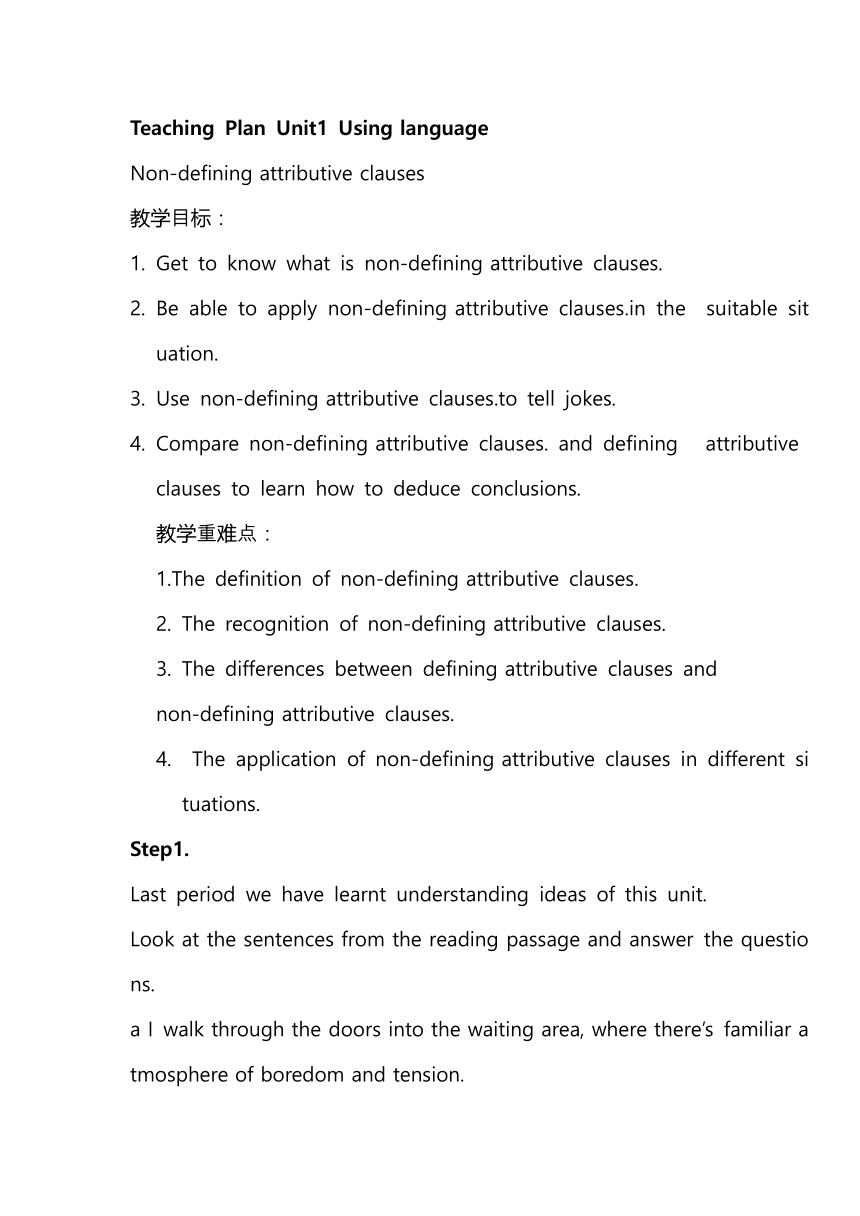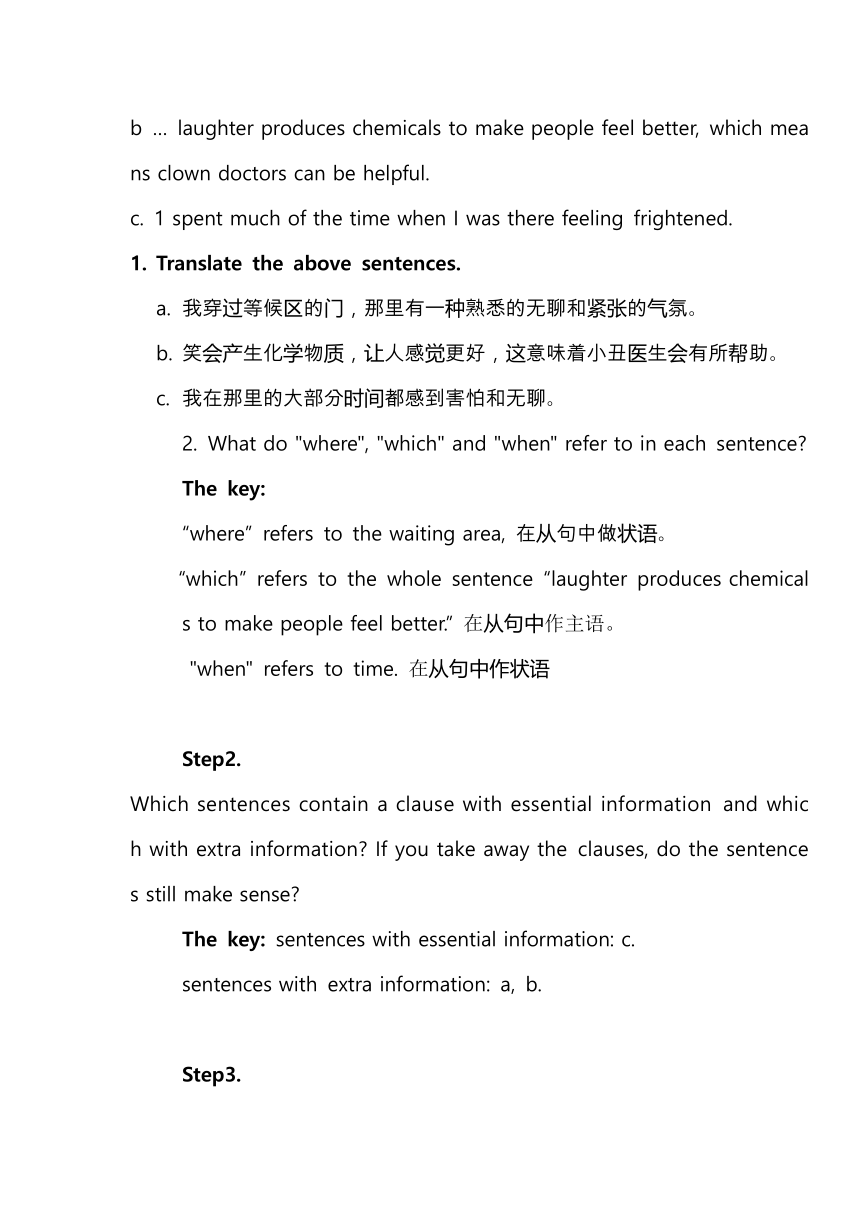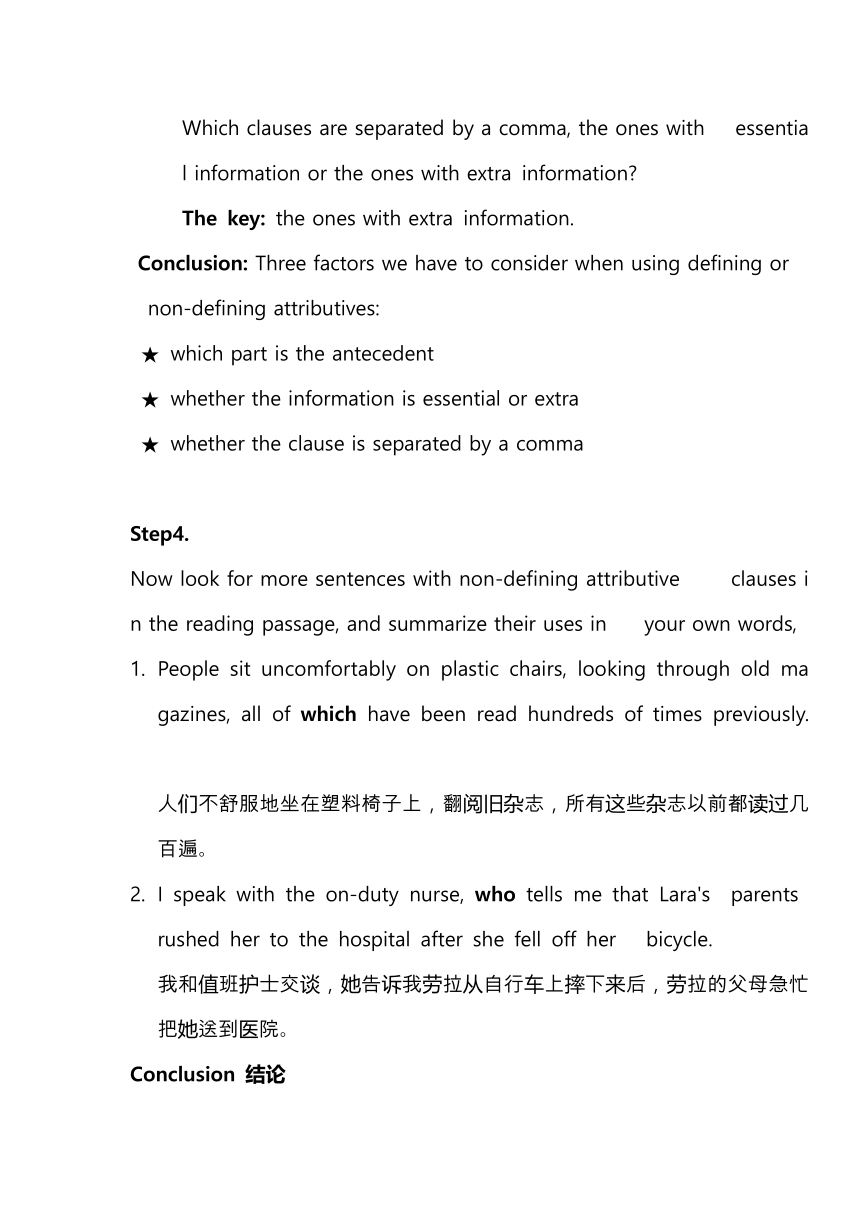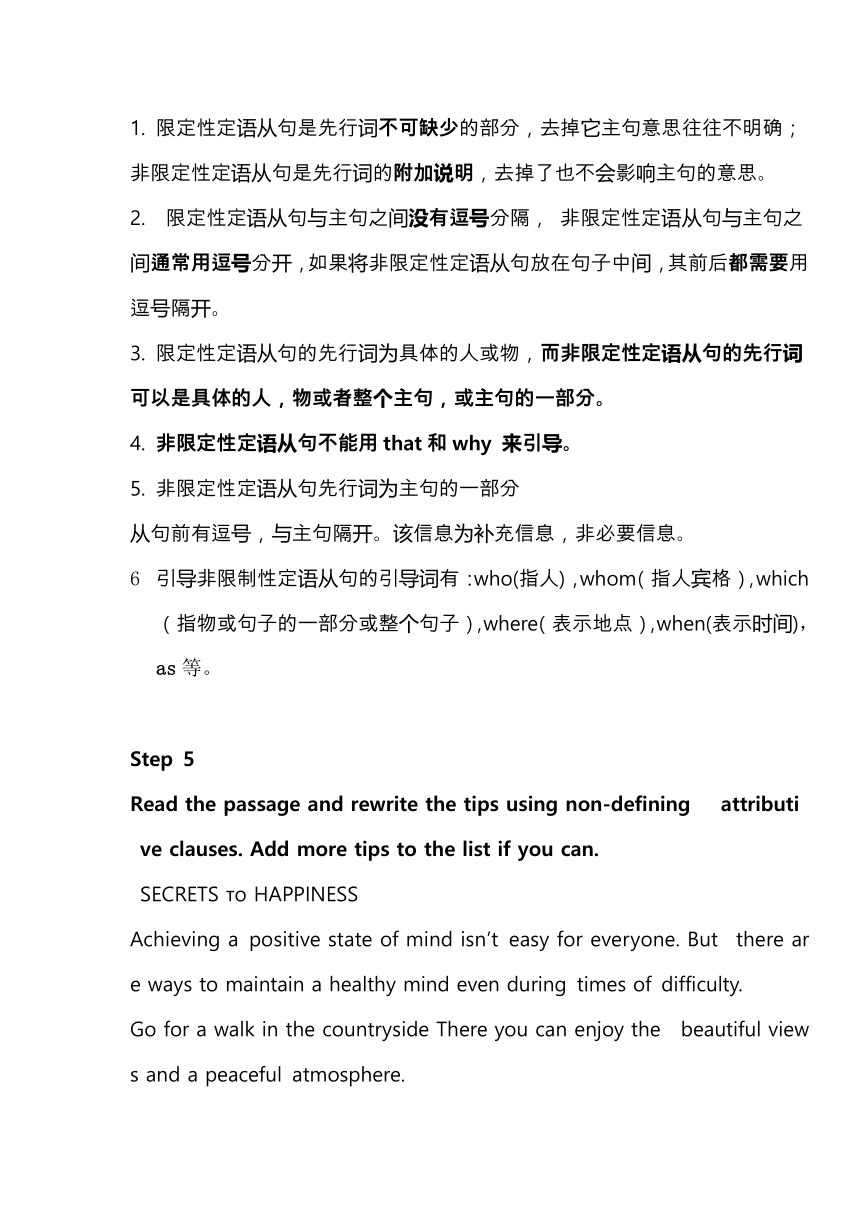外研版(2019)英语选择性必修第一册 Unit 1 Laugh out loud Using Languange
文档属性
| 名称 | 外研版(2019)英语选择性必修第一册 Unit 1 Laugh out loud Using Languange |  | |
| 格式 | doc | ||
| 文件大小 | 57.5KB | ||
| 资源类型 | 教案 | ||
| 版本资源 | 外研版(2019) | ||
| 科目 | 英语 | ||
| 更新时间 | 2022-09-02 11:58:22 | ||
图片预览




文档简介
Teaching Plan Unit1 Using language
Non-defining attributive clauses
教学目标:
1. Get to know what is non-defining attributive clauses.
2. Be able to apply non-defining attributive clauses.in the suitable situation.
3. Use non-defining attributive clauses.to tell jokes.
4. Compare non-defining attributive clauses. and defining attributive clauses to learn how to deduce conclusions.
教学重难点:
1.The definition of non-defining attributive clauses.
2. The recognition of non-defining attributive clauses.
3. The differences between defining attributive clauses and
non-defining attributive clauses.
4. The application of non-defining attributive clauses in different situations.
Step1.
Last period we have learnt understanding ideas of this unit.
Look at the sentences from the reading passage and answer the questions.
a I walk through the doors into the waiting area, where there’s familiar atmosphere of boredom and tension.
b … laughter produces chemicals to make people feel better, which means clown doctors can be helpful.
c. 1 spent much of the time when I was there feeling frightened.
1. Translate the above sentences.
a. 我穿过等候区的门,那里有一种熟悉的无聊和紧张的气氛。
b. 笑会产生化学物质,让人感觉更好,这意味着小丑医生会有所帮助。
c. 我在那里的大部分时间都感到害怕和无聊。
2. What do "where", "which" and "when" refer to in each sentence
The key:
“where” refers to the waiting area, 在从句中做状语。
“which” refers to the whole sentence “laughter produces chemicals to make people feel better.” 在从句中作主语。
"when" refers to time. 在从句中作状语
Step2.
Which sentences contain a clause with essential information and which with extra information If you take away the clauses, do the sentences still make sense
The key: sentences with essential information: c.
sentences with extra information: a, b.
Step3.
Which clauses are separated by a comma, the ones with essential information or the ones with extra information
The key: the ones with extra information.
Conclusion: Three factors we have to consider when using defining or non-defining attributives:
★ which part is the antecedent
★ whether the information is essential or extra
★ whether the clause is separated by a comma
Step4.
Now look for more sentences with non-defining attributive clauses in the reading passage, and summarize their uses in your own words,
1. People sit uncomfortably on plastic chairs, looking through old magazines, all of which have been read hundreds of times previously.
人们不舒服地坐在塑料椅子上,翻阅旧杂志,所有这些杂志以前都读过几百遍。
2. I speak with the on-duty nurse, who tells me that Lara's parents rushed her to the hospital after she fell off her bicycle.
我和值班护士交谈,她告诉我劳拉从自行车上摔下来后,劳拉的父母急忙把她送到医院。
Conclusion 结论
1. 限定性定语从句是先行词不可缺少的部分,去掉它主句意思往往不明确;非限定性定语从句是先行词的附加说明,去掉了也不会影响主句的意思。
2. 限定性定语从句与主句之间没有逗号分隔, 非限定性定语从句与主句之间通常用逗号分开,如果将非限定性定语从句放在句子中间,其前后都需要用逗号隔开。
3. 限定性定语从句的先行词为具体的人或物,而非限定性定语从句的先行词可以是具体的人,物或者整个主句,或主句的一部分。
4. 非限定性定语从句不能用that和why 来引导。
5. 非限定性定语从句先行词为主句的一部分
从句前有逗号,与主句隔开。该信息为补充信息,非必要信息。
6 引导非限制性定语从句的引导词有:who(指人),whom(指人宾格),which(指物或句子的一部分或整个句子),where(表示地点),when(表示时间),as等。
Step 5
Read the passage and rewrite the tips using non-defining attributive clauses. Add more tips to the list if you can.
SECRETS то HAPPINESS
Achieving a positive state of mind isn’t easy for everyone. But there are ways to maintain a healthy mind even during times of difficulty.
Go for a walk in the countryside There you can enjoy the beautiful views and a peaceful atmosphere.
Spend time with your family and friends. This will activate chemicals in your brain to make you feel happier,
Try to accept your mistakes. You can learn a lot through them,
Close your eyes and picture the future. You’ve made your dreams come true.
The key:
1. Go for a walk in the countryside, where you can enjoy the beautiful views and a peaceful atmosphere. 在从句中作地点状语
2. Spend time with your family and friends, which will activate chemicals in your brain to make you feel happier.
3. Try to accept your mistakes, through which you can learn a lot.
4. Close your eyes and picture the future, when You’ve made your dreams come true. 在从句中作时间状语
Which 引导的非限定性定语从句,which在从句中作主语、动词或介词宾语或表语,指代主句中的一部分或整个主句,which引导的非限定性定语从句所在的位置比较自由,在读写练习中最常见。
Step 6
Complete the joke with the sentence parts in the box using who/ which and put commas in the correct position.
One day, Sherlock Holmes and Dr Watson go camping They put up their tent under the stars and go to sieep. Suddenly, in the middle of the night, Watson is woken up by Holmes 1___________ "Watson," Holmes says, "look up at the stars, and tell me what they tell you." Not quite sure what he means, Watson thinks Holmes is joking 2 __________________ at this time of night, Even so, he replies, "1 see millions of stars and its quite likely there are some planets like Earth. And if so, this means that there might also be life on other planets." Watson is pleased with his answer 3__________________________. But
Holmes 4_________________________ shouts, "Watson, look around you! Use your eyes ! Somebody’s stolen our tent !”
The key:
1. , who is lying next to him.
2. , which he finds annoying
3. , which he thinks will impress Holmes.
4. ,. who has lost his patience by now ,
Step 7
Think of a joke you find funny and write it down using non- defining attributive clauses where appropriate. Then share your joke with the class.
The possible version of jokes:
Customer: Excuse me, there is a fly in my porridge.
Waiter: Don’t worry, sir, That spider, which is on your bread, will soon get him.
Step 8
Homework
Finish the following exercise to consolidate what you’ve learnt.
Whose引导的非限定性定语从句,whose是关系代词who的所有格形式,在从句中作定语,说明某物与某人或某物之间的所属关系。whose通常指人,也可指动物或无生命的事物。
用 who, whom, whose 或 that 完成下列句子。
1. My cousin _________ mother is my father’s sister was born at New York.
2. The building __________ door is red is our learning area.
3. He is the man _____________ I came across on the street 4. God helps those _______ help themselves.
5. He is so kind, ________makes she admire him.
答案:1. whose 2. whose
3. who/ that/ whom 4. Who 当先行词是 those 定语从句用who,而不用that引导。
5. which
as 引导非限制性定语从句时,代替整个句子,对主句进行补充说明,通常用于as we all know, 正如我们都知道的
as is known to all 正如我们都知道的
as is said above 正如上面所说
as is known to all 正如我们都知道的
as is said above 正如上面所说的
as is always mentioned above 正如上面提到的
as is often the case 这是经常发生的
as is reported in the newspaper 正如报纸上报道的,等句式中。as在非限制性定语从句中作主语、宾语, 且引出的从句位置比较灵活,常位于句首,也可置于主句中间。通常由逗号将其与主句隔开。as有“正如……就像……” 之意。
用that, who, whom, which,when, where 和 as完成下列句子。
1. She is the one_____ I am eager to meet.
2. We warmly welcomed the foreign guests at the airport, most of _________ were scientists.
3. Our guide, ______was a French Canadian, was an excellent cook.
4. Music is a form of art, without _______ the world can be dull.
5. She is stubborn, ______keeps she from making more friends.
6. _______ we all know, a loving husband can build a warmer
home.
7. This is the same book _______ I lost yesterday.
8. He forgot to bring his pen with him,__________ Was often the case.
9. I can never forget the day, _____ I won my first prize.
10. I can never forget the day _____ I spent at the countryside.
11. I fell off at my front garden, ______ I found a rose.
12. I fell off at my front garden ______is located just before my house.
答案:1 who 当先行词是one时定语从句的引导词只用who, 不用that. 2. Whom在从句中作介词宾语
3. who 在从句中作主语
4. which在从句中作介词宾语
5. which在从句中作主语指代签名整句话。
6. as 引导非限制性定语从句,指代后面整句话在从句中作宾语。
7. as 引导非限制性定语从句,指代前面整句话在从句中作宾语。
8. as 引导非限制性定语从句,指代前面整句话在从句中作主语。
9. when 在从句中作时间状语。
10. that/ which/省略 在从句中作宾语。
11. where 在从句中作地点状语。
12. which/ that 在从句中作主语。
has lost his patience by now
he thinks will impress Holmes
is lying next to him
he finds annoying
Non-defining attributive clauses
教学目标:
1. Get to know what is non-defining attributive clauses.
2. Be able to apply non-defining attributive clauses.in the suitable situation.
3. Use non-defining attributive clauses.to tell jokes.
4. Compare non-defining attributive clauses. and defining attributive clauses to learn how to deduce conclusions.
教学重难点:
1.The definition of non-defining attributive clauses.
2. The recognition of non-defining attributive clauses.
3. The differences between defining attributive clauses and
non-defining attributive clauses.
4. The application of non-defining attributive clauses in different situations.
Step1.
Last period we have learnt understanding ideas of this unit.
Look at the sentences from the reading passage and answer the questions.
a I walk through the doors into the waiting area, where there’s familiar atmosphere of boredom and tension.
b … laughter produces chemicals to make people feel better, which means clown doctors can be helpful.
c. 1 spent much of the time when I was there feeling frightened.
1. Translate the above sentences.
a. 我穿过等候区的门,那里有一种熟悉的无聊和紧张的气氛。
b. 笑会产生化学物质,让人感觉更好,这意味着小丑医生会有所帮助。
c. 我在那里的大部分时间都感到害怕和无聊。
2. What do "where", "which" and "when" refer to in each sentence
The key:
“where” refers to the waiting area, 在从句中做状语。
“which” refers to the whole sentence “laughter produces chemicals to make people feel better.” 在从句中作主语。
"when" refers to time. 在从句中作状语
Step2.
Which sentences contain a clause with essential information and which with extra information If you take away the clauses, do the sentences still make sense
The key: sentences with essential information: c.
sentences with extra information: a, b.
Step3.
Which clauses are separated by a comma, the ones with essential information or the ones with extra information
The key: the ones with extra information.
Conclusion: Three factors we have to consider when using defining or non-defining attributives:
★ which part is the antecedent
★ whether the information is essential or extra
★ whether the clause is separated by a comma
Step4.
Now look for more sentences with non-defining attributive clauses in the reading passage, and summarize their uses in your own words,
1. People sit uncomfortably on plastic chairs, looking through old magazines, all of which have been read hundreds of times previously.
人们不舒服地坐在塑料椅子上,翻阅旧杂志,所有这些杂志以前都读过几百遍。
2. I speak with the on-duty nurse, who tells me that Lara's parents rushed her to the hospital after she fell off her bicycle.
我和值班护士交谈,她告诉我劳拉从自行车上摔下来后,劳拉的父母急忙把她送到医院。
Conclusion 结论
1. 限定性定语从句是先行词不可缺少的部分,去掉它主句意思往往不明确;非限定性定语从句是先行词的附加说明,去掉了也不会影响主句的意思。
2. 限定性定语从句与主句之间没有逗号分隔, 非限定性定语从句与主句之间通常用逗号分开,如果将非限定性定语从句放在句子中间,其前后都需要用逗号隔开。
3. 限定性定语从句的先行词为具体的人或物,而非限定性定语从句的先行词可以是具体的人,物或者整个主句,或主句的一部分。
4. 非限定性定语从句不能用that和why 来引导。
5. 非限定性定语从句先行词为主句的一部分
从句前有逗号,与主句隔开。该信息为补充信息,非必要信息。
6 引导非限制性定语从句的引导词有:who(指人),whom(指人宾格),which(指物或句子的一部分或整个句子),where(表示地点),when(表示时间),as等。
Step 5
Read the passage and rewrite the tips using non-defining attributive clauses. Add more tips to the list if you can.
SECRETS то HAPPINESS
Achieving a positive state of mind isn’t easy for everyone. But there are ways to maintain a healthy mind even during times of difficulty.
Go for a walk in the countryside There you can enjoy the beautiful views and a peaceful atmosphere.
Spend time with your family and friends. This will activate chemicals in your brain to make you feel happier,
Try to accept your mistakes. You can learn a lot through them,
Close your eyes and picture the future. You’ve made your dreams come true.
The key:
1. Go for a walk in the countryside, where you can enjoy the beautiful views and a peaceful atmosphere. 在从句中作地点状语
2. Spend time with your family and friends, which will activate chemicals in your brain to make you feel happier.
3. Try to accept your mistakes, through which you can learn a lot.
4. Close your eyes and picture the future, when You’ve made your dreams come true. 在从句中作时间状语
Which 引导的非限定性定语从句,which在从句中作主语、动词或介词宾语或表语,指代主句中的一部分或整个主句,which引导的非限定性定语从句所在的位置比较自由,在读写练习中最常见。
Step 6
Complete the joke with the sentence parts in the box using who/ which and put commas in the correct position.
One day, Sherlock Holmes and Dr Watson go camping They put up their tent under the stars and go to sieep. Suddenly, in the middle of the night, Watson is woken up by Holmes 1___________ "Watson," Holmes says, "look up at the stars, and tell me what they tell you." Not quite sure what he means, Watson thinks Holmes is joking 2 __________________ at this time of night, Even so, he replies, "1 see millions of stars and its quite likely there are some planets like Earth. And if so, this means that there might also be life on other planets." Watson is pleased with his answer 3__________________________. But
Holmes 4_________________________ shouts, "Watson, look around you! Use your eyes ! Somebody’s stolen our tent !”
The key:
1. , who is lying next to him.
2. , which he finds annoying
3. , which he thinks will impress Holmes.
4. ,. who has lost his patience by now ,
Step 7
Think of a joke you find funny and write it down using non- defining attributive clauses where appropriate. Then share your joke with the class.
The possible version of jokes:
Customer: Excuse me, there is a fly in my porridge.
Waiter: Don’t worry, sir, That spider, which is on your bread, will soon get him.
Step 8
Homework
Finish the following exercise to consolidate what you’ve learnt.
Whose引导的非限定性定语从句,whose是关系代词who的所有格形式,在从句中作定语,说明某物与某人或某物之间的所属关系。whose通常指人,也可指动物或无生命的事物。
用 who, whom, whose 或 that 完成下列句子。
1. My cousin _________ mother is my father’s sister was born at New York.
2. The building __________ door is red is our learning area.
3. He is the man _____________ I came across on the street 4. God helps those _______ help themselves.
5. He is so kind, ________makes she admire him.
答案:1. whose 2. whose
3. who/ that/ whom 4. Who 当先行词是 those 定语从句用who,而不用that引导。
5. which
as 引导非限制性定语从句时,代替整个句子,对主句进行补充说明,通常用于as we all know, 正如我们都知道的
as is known to all 正如我们都知道的
as is said above 正如上面所说
as is known to all 正如我们都知道的
as is said above 正如上面所说的
as is always mentioned above 正如上面提到的
as is often the case 这是经常发生的
as is reported in the newspaper 正如报纸上报道的,等句式中。as在非限制性定语从句中作主语、宾语, 且引出的从句位置比较灵活,常位于句首,也可置于主句中间。通常由逗号将其与主句隔开。as有“正如……就像……” 之意。
用that, who, whom, which,when, where 和 as完成下列句子。
1. She is the one_____ I am eager to meet.
2. We warmly welcomed the foreign guests at the airport, most of _________ were scientists.
3. Our guide, ______was a French Canadian, was an excellent cook.
4. Music is a form of art, without _______ the world can be dull.
5. She is stubborn, ______keeps she from making more friends.
6. _______ we all know, a loving husband can build a warmer
home.
7. This is the same book _______ I lost yesterday.
8. He forgot to bring his pen with him,__________ Was often the case.
9. I can never forget the day, _____ I won my first prize.
10. I can never forget the day _____ I spent at the countryside.
11. I fell off at my front garden, ______ I found a rose.
12. I fell off at my front garden ______is located just before my house.
答案:1 who 当先行词是one时定语从句的引导词只用who, 不用that. 2. Whom在从句中作介词宾语
3. who 在从句中作主语
4. which在从句中作介词宾语
5. which在从句中作主语指代签名整句话。
6. as 引导非限制性定语从句,指代后面整句话在从句中作宾语。
7. as 引导非限制性定语从句,指代前面整句话在从句中作宾语。
8. as 引导非限制性定语从句,指代前面整句话在从句中作主语。
9. when 在从句中作时间状语。
10. that/ which/省略 在从句中作宾语。
11. where 在从句中作地点状语。
12. which/ that 在从句中作主语。
has lost his patience by now
he thinks will impress Holmes
is lying next to him
he finds annoying
